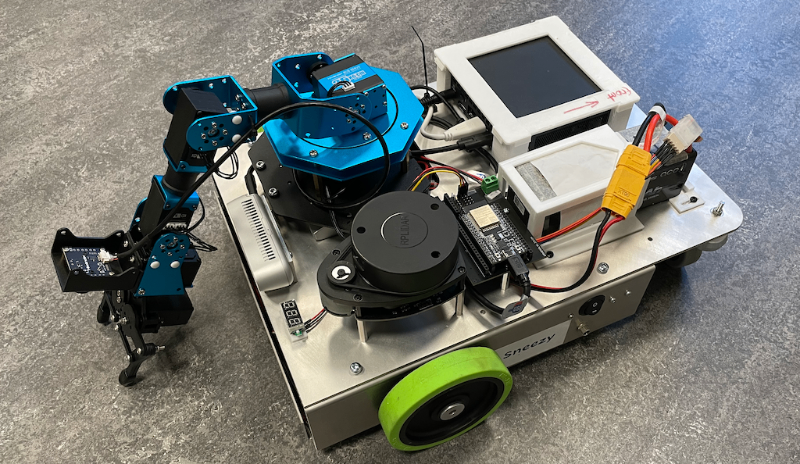The main task in the course is to design, implement and evaluate robots to solve certain specific assignments. The work is carried out in groups as a project. The assignments that should be solved are large and complicated enough to put the project groups in situations where one is forced to prioritise and handle limitations, especially in time.
DD2419 Project Course in Robotics and Autonomous Systems 9.0 credits

This course is an advanced course in computer science running over two periods and focusing on the broad, inter-disciplinary field of robotics. The emphasis in DD2419 is on showing how methods are used in practice and how they are integrated into a complete system. It follows up on the course DD2410, which gives a broad introduction to robotics. To keep things manageable and steer the learning in DD2419, the project task is predefined. So you will not be able to define your own project, but you will have loads of fun anyway! You will be working with a mobile robot equipped with an arm, and RGB-D camera and a 2D laser scanner in the project.
The first assignment is an individual assignment ("boot camp"). This aims to make all students familiar with the basic methods and software used in the project and as such enable all to contribute better to the project work later. This also serves as the test for the ability to use ROS which is a requirement for the course. You need to pass the boot camp assignment no later than one week after the last official presentation slot to be allowed to continue the course.
Information per course offering
Information for Spring 2026 Start 13 Jan 2026 programme students
- Course location
KTH Campus
- Duration
- 13 Jan 2026 - 1 Jun 2026
- Periods
Spring 2026: P4 (4.5 hp), P3 (4.5 hp)
- Pace of study
33%
- Application code
60318
- Form of study
Normal Daytime
- Language of instruction
English
- Course memo
- Course memo is not published
- Number of places
Max: 45
- Target group
- Open to students admitted to a master's programme as long as the course can be included in the programme.
- Planned modular schedule
- [object Object]
- Schedule
- Part of programme
Master's Programme, Embedded Systems, year 2, INPF
Master's Programme, Systems, Control and Robotics, year 1, RASM
Master's Programme, Embedded Systems, year 2, INMV
Master's Programme, Embedded Systems, year 2, INEL
Master's Programme, Industrial Engineering and Management, year 1, MAIG
Master's Programme, Computer Science, year 1, CSCS
Master's Programme, Systems, Control and Robotics, year 2, RASM
Master's Programme, Machine Learning, year 1
Contact
Course syllabus as PDF
Please note: all information from the Course syllabus is available on this page in an accessible format.
Course syllabus DD2419 (Spring 2025–)Content and learning outcomes
Course contents
Intended learning outcomes
On completion of the course, the student should be able to
- implement and integrate software components for robots
- solve an assignment in robotics with limited resources
in order to
- be able to work with autonomous and other complex systems in research and/or development
- improve the skills of planning and carrying out development work in project groups.
Literature and preparations
Specific prerequisites
Knowledge of introductory robotics, 7.5 credits, equivalent to completed course DD2410
or that the student meets the following three requirements:
- knowledge and skills in programming, 6 credits, equivalent to completed course DD1337/DD1310-DD1319/DD1321/DD1331/DD100N/ID1018
- knowledge of algorithms and data structures, 6 credits, equivalent to completed course DD1338/ID1020/ID1021/DD1320-DD1328
- additional skills in independent software development, 30 credits, in addition to the above-mentioned courses, from completed courses in computer science, computer technology or numerical methods with laboratory elements that are not carried out in groups larger than two people.
Recommended prerequisites
DD2410 "Introduction to robotics" or equivalent
Bachelor degree or similar out of which 45 ECTS in mathematics or information technology.
English level B or equivalent
Literature
Examination and completion
Grading scale
Examination
- INL1 - Project preparations, 0.5 credits, grading scale: P, F
- PRO1 - Project work, 7.5 credits, grading scale: P, F
- INL2 - Project documentation, 1.0 credits, grading scale: P, F
Based on recommendation from KTH’s coordinator for disabilities, the examiner will decide how to adapt an examination for students with documented disability.
The examiner may apply another examination format when re-examining individual students.
If the course is discontinued, students may request to be examined during the following two academic years.
Passing item INL1 is required before participatíng in the grupprojektarbetet (INL2 and PRO1).
Examiner
Ethical approach
- All members of a group are responsible for the group's work.
- In any assessment, every student shall honestly disclose any help received and sources used.
- In an oral assessment, every student shall be able to present and answer questions about the entire assignment and solution.
Further information
Course room in Canvas
Offered by
Main field of study
Education cycle
Supplementary information
In this course, the EECS code of honor applies, see:
http://www.kth.se/en/eecs/utbildning/hederskodex